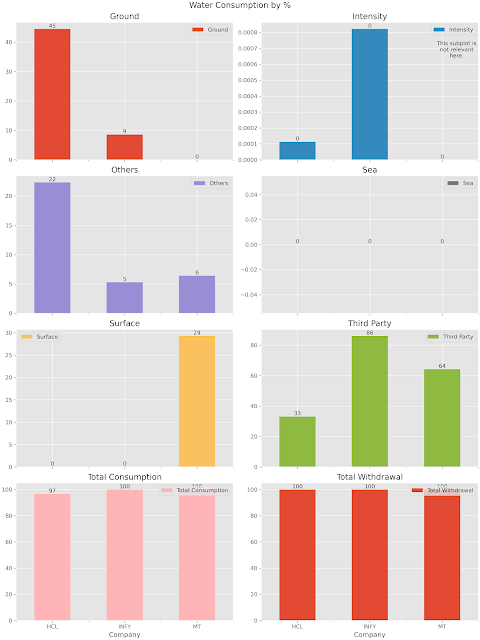Water Consumption Data of 3 leading Indian IT companies.
Background:
Kindly refer to my last blog post which was about scrapping energy data, from xml file containing Business Responsibility Report in machine readable XBR language, of 3 leading Indian companies namely MindTree, Infosys and HCL.
About this post:
This post reads data from the same xml file and XBRL on how much water was drawn from various sources and how much was consumed from water consumption data of 3 leading Indian IT companies.
The two visualisations at the end show all the data (in absolute and percentages) in bar charts for ease of reading and understanding.
Let us begin. The xml and XBRL file was read using Python script and data was plotted using Matplotlib.
Section - I)
Water withdrawal by source (in kilolitres)
i) Surface water
Apparently only MindTree used surface water. 29% of the total water consumption of MindTree was from surface water. The other two companies didn’t.
(ii) Groundwater
It is the other way round. MindTree didn’t use ground water, but the other two companies did. Infosys usage was 45% of its total water consumption. It was 9% of usage in case of HCL.
(iii) Third party water
Third party water was used by all. From the human readable BRR, you can see the break up of third party water for MindTree namely water from municipal corporation, private sources and packaged water. The other two companies didn’t give any further break up.
MindTree usage was 64%, Infosys used 86% whereas it was 33% for HCL.
(iv) Seawater / desalinated water
The usage of it was zero or not applicable for all the three companies.
(v) Others
In case of MindTree (6% of its total) and Infosys (5% of its total) this source was rainwater. In case of HCL (22% of its total) it included rainwater plus municipal water.
Total volume of water withdrawal (in kilolitres) (i + ii + iii + iv + v )
This was total of all the above sources.
Total volume of water consumption (in kilolitres)
The water consumption was equal to water withdrawal for MindTree and Infosy. But water consumed was 97% and was lower compared with water withdrawn in case of HCL.
Water intensity per rupee of turnover (Water consumed / turnover)
Unlike last time, I did not do any calculation on my own. Infosys reported WI with Rs Crore in the denominator, while HCL reported the WI with Rs Million in the denominator. WI of HCL can be compared with that of Infosys by multiplying it by 10. MindTree reported zero.
Water intensity (optional)
MindTree reported it by using area in the denominator but the other two companies didn’t.
Section - II)
Water Discharge
Water discharge has to be reported on all the parameters mentioned above for water sources with additional information on discharge mentioning if the discharge was treated before discharge.
MindTree reported zero liquid discharge for all its sites by 100% recycling.
Similarly Infosys reported no discharge in any of these categories. Infosys treated Waste water generated in sewage treatment plants and reused for purposes like landscaping, HVAC applications and flushing.
HCL reported a discharge of 23,453.06 kilolitres that was sent to third parties with no treatment.
Chart showing water consumption absolute numbers
Chart showing water consumption percentage wise
Conclusion
Thus it is convenient to read and extract data from xml and xbrl machine-readable Business Responsibility Report (BAA). This approach reduces the errors introduced in manually copying and pasting the data. This was the very purpose of introducing this format.







